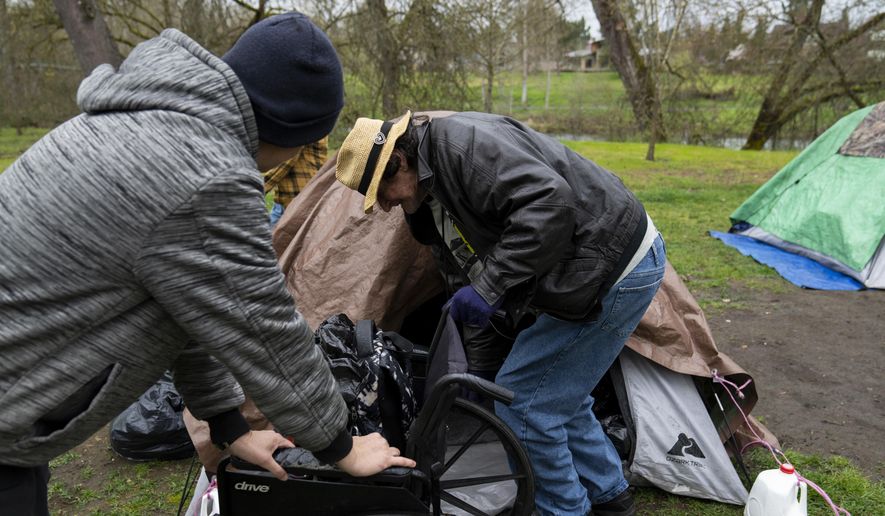The Supreme Court appeared divided Monday on efforts to police homeless encampments, recognizing the makeshift camps as a burden on cities while also indicating sympathy for people who have nowhere to go.
The justices heard arguments over ordinances implemented by Grants Pass, Oregon, that prohibit homeless people from sleeping in public parks and on streets and sidewalks.
Critics say the ordinances, under which violators are fined, run afoul of the Eighth Amendment’s ban on cruel and unusual punishment.
The liberal wing of the court was united in criticizing the city’s laws, which one described as lacking compassion.
“For a homeless person who has no place to go, sleeping in public is like breathing in public,” said Justice Elena Kagan, an Obama appointee.
“Here, we’re talking about sleeping. That is universal. That is a basic function,” said Justice Ketanji Brown Jackson, a Biden appointee.
“Are they supposed to kill themselves not sleeping?” said Justice Sonia Sotomayor, an Obama appointee.
But the court’s conservative wing appeared sympathetic to cities’ needs to provide safety and improve conditions on the streets.
“It is a very difficult policy question,” said Justice Amy Coney Barrett, a Trump appointee. “It is difficult to draw the line.”
“Municipalities have competing priorities. I mean, what if there are lead pipes in the water? Do you build the homeless shelter or do you take care of the lead pipes? What if there aren’t — isn’t enough fire protection? Which one do you prioritize?” said Chief Justice John G. Roberts Jr., a Bush appointee. “Why would you think these nine people are the best people to judge and weigh those policy judgments?”
Homeless people sued Grants Pass in 2018 over its three ordinances that bar sleeping or camping on public sidewalks, parks and streets. Violators receive a civil fine, not criminal punishment.
The U.S. District Court for Oregon ruled that the ordinances violated the Eighth Amendment’s ban on “cruel and unusual punishment,” issuing a class-wide injunction against the measures.
Grants Pass lost its appeal in the 9th U.S. Circuit of Appeals and took its case to the Supreme Court last year.
Theane D. Evangelis, the lawyer representing Grants Pass, told the justices that intervention actually helps the homeless by taking them off the streets, providing services elsewhere and giving them options for help.
She defended the ordinances as not only helping the city but also helping the homeless.
“They protect the health and safety of everyone. It is not safe to live in encampments. It is unsanitary,” Ms. Evangelis said.
“The federal government has cleared encampments here,” she noted, referring to homeless camps being cleared in the nation’s capital.
The justices, who are expected to issue a decision by the end of June, will decide if laws that regulate homeless encampments on public property amount to “cruel and unusual punishment” under the Eighth Amendment.
The homeless people who won their initial class-action lawsuit against Grants Pass said in their filing that the ordinances were an effort to push them out of the city. They argued the city lacks enough beds for the roughly 600-1,000 homeless in the area.
Kelsi B. Corkran, who represented the homeless people challenging the city’s regulation, said the ordinances make it physically impossible to live in Grants Pass.
“The challenged ordinances inflict status-based punishments,” Ms. Corkran said, adding that one is punished for not having a permanent residence.
The Justice Department argued that the ordinances are unlawful but disagreed with the lower court’s broad injunctive relief.
“The ordinances are the equivalent of making it a crime to be homeless,” said Edwin S. Kneedler, deputy solicitor general at the Justice Department. “If you cannot sleep, you cannot live.”
The case is City of Grants Pass, Oregon v. Gloria Johnson, et al.
• Alex Swoyer can be reached at aswoyer@washingtontimes.com.




Please read our comment policy before commenting.